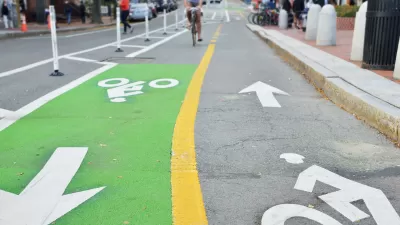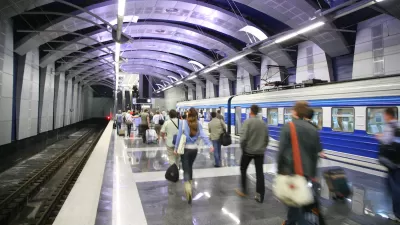Connecting competence to organized support is key to reversing the Sisyphean cycle of urban placemaking.
The new urbanists have been organized for 22 years, and in some respects they have achieved remarkable success. Their intellectual contributions and their practical ideas related to human-scale placemaking have been widely accepted by planners and developers.
And yet employing this toolkit remains nonstandard practice in the vast majority of land in our metropolitan regions. Conventional suburban development and automobile-oriented roads are still the default way of building in most cases. Reforming entrenched land-use laws and systems feels like a Sisyphean task — rolling boulders uphill time after time.
Diverging from standard practice implies a lot of risk for planners and builders who don't want to get squashed — even in a metaphorical sense. How do we roll the rocks downhill instead and let gravity do the work? The market is ready for a torrent of activity — the pent-up demand for urban places is tremendous.
FULL STORY: Come together locally for smarter growth

Maui's Vacation Rental Debate Turns Ugly
Verbal attacks, misinformation campaigns and fistfights plague a high-stakes debate to convert thousands of vacation rentals into long-term housing.

Planetizen Federal Action Tracker
A weekly monitor of how Trump’s orders and actions are impacting planners and planning in America.

In Urban Planning, AI Prompting Could be the New Design Thinking
Creativity has long been key to great urban design. What if we see AI as our new creative partner?

Baker Creek Pavilion: Blending Nature and Architecture in Knoxville
Knoxville’s urban wilderness planning initiative unveils the "Baker Creek Pavilion" to increase the city's access to green spaces.

Pedestrian Deaths Drop, Remain Twice as High as in 2009
Fatalities declined by 4 percent in 2024, but the U.S. is still nowhere close to ‘Vision Zero.’

King County Supportive Housing Program Offers Hope for Unhoused Residents
The county is taking a ‘Housing First’ approach that prioritizes getting people into housing, then offering wraparound supportive services.
Urban Design for Planners 1: Software Tools
This six-course series explores essential urban design concepts using open source software and equips planners with the tools they need to participate fully in the urban design process.
Planning for Universal Design
Learn the tools for implementing Universal Design in planning regulations.
planning NEXT
Appalachian Highlands Housing Partners
Mpact (founded as Rail~Volution)
City of Camden Redevelopment Agency
City of Astoria
City of Portland
City of Laramie





























